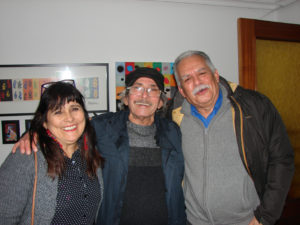**This is the second post in a two-part series about Venezuelan journalists who left their country in search of work and security, and have set up journalistic initiatives abroad.
More than 4.6 million people fled the humanitarian, economic and political crisis of the Nicolás Maduro regime in Venezuela between 2016 and November 2019. Due to a lack of financial stability, job options and sometimes censorship or harassment, journalists have found themselves among that group.
As they’ve built new lives abroad, just some of these professionals have joined the media in their adopted countries. Despite having to take on other jobs to stay afloat and a lack of money and other resources, others have created websites and print publications to meet the demand for information from the Venezuelan community abroad.
Many of the experiences explored in this report are in their initial phase of development and others in their experimental phase. All initiatives generate original content, mainly in the country where the website was launched, covering information about the Venezuelan communities established in those nations. The original content is also produced by volunteer correspondent networks around the world, particularly when a high-profile event is happening in Venezuela and abroad with that community.
All those interviewed agree on the need to define business models to ensure the sustainability of the projects, expand the production and dissemination of their ventures, in particular those with a web presence and that are complemented by social networks. The vast majority maintain their initiatives with their own resources.
Even with scarce funds, more and more migrant Venezuelan journalists of all generations are undertaking journalistic initiatives, pioneers on the Internet and in social networks, even in print, to continue professionally and offer a space for Venezuelans abroad to meet.
In 2016, after working as a night web editor of Últimas Noticias of Cadena Capriles and in several radio stations in Venezuela, José Rafael Mata decided to leave his country for the future of his family and daughter. Ten months after his arrival to the Dominican Republic, he decided to call on his experience as a journalist and knowledge in digital marketing. He would “run the risk with his colleagues to do something together,” relying on his own technical and financial resources.

Jose Rafael Mata from Panas Digitales (Courtesy)
Thus, Panas Digitales was born.
It’s a “collaborative project, rather than a media outlet, through which Venezuelan journalists can keep alive the possibility of continuing the passion for journalism,” Mata, co-founder of the site and former founder of the well-known Venezuelan site Caraota Digital, explained to the Knight Center.
As its name indicates, in November 2016, Mata and four "panas" (friends, companions) decided to launch this news website about the Venezuelan diaspora in the Dominican Republic and throughout the world. “We were the first specialized site to report on the diaspora,” Mata said.
Panas Digitales promotes collaborative journalism through its own co-founders who are in various countries. The digital newsroom of this online outlet have the participation of Mata's former co-workers from media company Cadena Capriles of Venezuela: Hilda Carmona (Peru), Desireé Lozano (Venezuela), Doris Barrios (Italy) and María Camarillo (Dominican Republic).
Mata said it took off quickly in the Dominican Republic. At that time, many Venezuelans had not yet arrived and there was no reference media outlet for fellow Venezuelan immigrants.
The launch of the website featured an exclusive report on a study of Venezuelan migration conducted by the University Simon Bolivar in Caracas. The web site reported 5,000 visits that day, Mata explained.
In June 2017, they had a unique opportunity to practice collaborative journalism simultaneously with the convocation of the Venezuelan opposition plebiscite. On that day, 54 journalists from 28 countries participated who collaborated with reports for Panas Digitales for two days in a row.
“This experience catapulted us in 2017. Until then, there had been no simultaneous international reporting project of more than 50 journalists. The same Venezuelan media added to the coverage or made reference to our work. We reached 500,000 thousand visits. Even SembraMedia [a nonprofit organization dedicated to Spanish-language digital media outlets] invited us to present our case,” Mata said.
Already more integrated in 2017, the digital collaborative newsroom produced content for the site and social networks. This newsroom consists of the founding colleagues that live in Peru, Italy and Venezuela. "We work a lot in ‘cold content’ that generates traffic, coverage of political information and demonstrations in different countries. We recorded an average of 14- and 40,000 visits, depending on the news event,” Mata said.
However, in 2017 daily collaborations declined because most journalists do not practice full-time journalism. They must dedicate themselves to other trades. The team has sporadic collaborators from 22 countries.
In 2018, the Panas Digitales website temporarily ceased operations due to a shortage of funds. However, they did not neglect social networks. Although they do not rule out reactivating the website, Panas Digitales aims to expand content for Facebook and resume its news programs on YouTube.
According to Mata, Panas Digitales has almost 25,000 followers on Facebook and reaches 300,000 monthly; on Twitter it has 39,700 followers and reported up to 1 million in engagement at peak times; on Instagram it has around 6,000 followers and reaches an average of 20- and 25,000 followers monthly.
“We are focused on giving social networks a boost. It is more profitable than having a website with a low margin of interaction. Our audience, 60 percent, interact in social networks. They didn't visit the website when it was active,” said Mata, who seeks to strengthen his information and marketing agency in Santo Domingo to reactivate the website and consolidate the presence of Panas Digitales on social networks.
Panas Digitales is an aggregator and bets on the exclusive generation of audiovisual content. They do not have resources to investigate. Currently, between 25 and 30 percent of content on Panas Digitales is original on all networks. The rest is collected weekly from various sources to produce and edit in 5-minute videos. They spread their videos mainly through Facebook and other networks with news for audiences segmented by countries. The most viewed content is related to immigration status and legislation, procedures, politics and crimes of Venezuelan women abroad.
Mata said that the main challenge of Panas Digitales is to survive and have more and more relevance. “We are reinventing ourselves all the time to stay in the social networks and generate information capsules with our audiences. We try to maintain connectivity and interaction with Venezuelans.”
El Vinotinto is the first Venezuelan monthly print publication for migrants with free distribution in Chilean territory and it also has an online presence. Created by a group of Venezuelan journalists, “El Vinotinto was born from the immense need to share feelings and experiences in exile, specifically in Chile,” the site says.

Víctor Higuera of El Vinotinto (Courtesy)
Víctor Higuera, executive director, told the Knight Center that the name symbolically associates Chile's most exported product with the color of the jerseys of the Venezuelan national soccer team.
Government agencies such as the National Institute of Statistics (INE) estimated in 2019 that 288,000 Venezuelans resided in Chile, to whom El Vinotinto reports with a monthly print edition and through its digital platforms (web and RR.SS.).
El Vinotinto was released in November 2016 and two months later Higuera started to direct this monthly print media outlet. The 16-page print publication has a circulation of 5,000 copies distributed free of charge at 80 distribution points in Santiago, Chile.
As indicated on the website, this publication is “an informative window created by Venezuelans and for Venezuelans, which seeks to promote good migration ... One of the firm purposes of El Vinotinto, beyond consolidating itself as the voice of Venezuelans in Chile, is to stimulate the integral growth of our people.”
With interns and 10 volunteer columnists, El Vinotinto produces its own information about the Venezuelan community in Chile. Higuera estimated that at least 90 percent of the content is related to Venezuelans in the southern country. At least 10 advertisers generate the investment required for the operation of the monthly publication.
In the web version and in social networks, the information is updated daily and comes from Chilean and Venezuelan media, and other sources of information. “The print content is 100% original. On the website, we take information from other sites and we also generate our own content. I would say in a proportion of 50-50. The same happens on social networks,” Higuera specified.
On Instagram, the publication has almost 70,000 followers and it’s level of engagement is 80 percent.
“We already have a reputation and credibility. Now we want expansion. To reach other regions of Chile with the monthly print edition. To employ new business strategies on the internet and improve informational and educational content on Instagram and YouTube,” Higuera concluded.
“Código M is a project oriented towards responsible migration… It is a dream that is materializing. A window where we can convey the best that we migrants have ... I feel it is a dream of four daring people who believe that things are possible,” the co-founders of Código M (Código Migrante) explained.

Samantha Media, Yurubi Espinoza, Marco González, and María Isoliett Iglesias from Código M (Courtesy)
In September 2019, four Venezuelan journalists and communicators in Santiago de Chile launched this internet initiative. María Isoliett Iglesias, Marco González, Samantha Medina and Yurubi Espinoza began to meet, restless and determined to propose an idea that would join together their talents and professional experiences to provide an optimistic, supportive and inclusive perspective of the phenomenon of immigration and the Venezuelan diaspora.
They arrived in Chile between the end of 2017 and the beginning of 2018. “The situation was already unlivable,” said Iglesias, or Manoa, as her friends know her. Even with three jobs, she could not support her mother and uncle.
Like her colleagues at Código M, Iglesias decided to emigrate to improve her quality of life and ensure a future for her family.
With four police novels written over a 19-year career in journalism, Iglesias was reunited with her half-sisters and family members and began working at a foundation a few months after her arrival.
In Chile, González and Espinoza found a place to bet on opportunities for growth and well-being for their family. González, an expert in digital communication, and Espinoza, an industrial engineer, bring their special skills to the team and project.
Samantha Medina, the youngest of the team, is the Código M producer and provides the “millennial look” to the digital and audiovisual content.
All of them devote extra time to their labor obligations to take full advantage of the Código M platform and make it grow outside Chile. “We differ by format and positive approach. We always have a message that adds up.”
In documentary format, Código M features videos of less than 5 minutes with life stories of Venezuelan migrants in Chile. Video is the star content. The site records 1,500 visits for each video. "We have had a lot of receptivity and visibility from other Venezuelan journalists and other media ... Many people helped spread Código M. The newspaper El Universal and Publimetro spread our videos," González explained.
Videos are posted weekly on the Código M blog. In its beginnings, the site dedicated its videos to report cases of successful, entrepreneurial and supportive Venezuelan migrants “to encourage the Venezuelan migrant, to rescue the value of responsibility and to generate empathy with Chilean citizens because we come to join in the right way.”
Currently, the Código M team has a new micro documentary series for its second season with stories of entrepreneurship. “Our biggest challenge is to convert Código M into a digital content producer, particularly mobile videos. We still have to mature the format and search for funding. Until this point, we’ve been able to operate Código M with our own resources.”
Motivated by the growing Venezuelan diaspora, four veteran Venezuelan journalists, (Víctor Suárez, Omar Pineda, Elizabeth Araujo and Sebastián de la Nuez), led the founding team of a website about “News of the Venezuelans who left.” Actualy.es launched online on Feb. 4, 2017.

Elizabeth Araujo, Víctor Suarez and Omar Pineda of Actualy.es (Courtesy)
The debut of the website coincided strategically with the coverage (texts, photos and videos) of a demonstration in the Puerta del Sol, Madrid, of Venezuelan pensioners and retirees who demanded fifteen months of overdue payments from the government of Nicolás Maduro. Since then, that debt has not stopped growing, without any attention, month after month.
Both those responsible for the website and the collaborators always work in unpaid positions, but with the hope of obtaining some financing. The initial team of collaborators counted on 17 journalists strategically located in Europe and on the American continent.
“Our purpose was always to communicate what was happening in exile: to report how they are rejecting us or how we are integrating… what are the obstacles to the ventures, what are the success stories. There are many stories that are scattered throughout the world that need to be told rigorously,” Víctor Suárez, president-director of Actualy.es, explained to the Knight Center. Although he moved to Madrid earlier in the decade, his colleagues were among the later arrivals to Europe.
The financing of this internet initiative is the main challenge to reporting on the many voices in the Venezuelan diaspora. Up to this point, they have tried sponsorships, crowdfunding campaigns and grants from international organizations, but without success.
In April 2012, María José Ramírez Braíz came up with the idea of transforming her column “Tel lo cuento” (I’ll tell you about it) that appeared in the newspaper Reporte de la Economía de Venezuela into a Facebook page. Under the name of TelocuentoNews, she began writing reports and opinion articles on Venezuela from a town near Kansas City, in the United States, along with five other Venezuelan and Colombian journalists.
It had been two years since her arrival in the United States, applying for asylum, and working for Univisión and TNT24 on the East Coast. The journalist’s case is particular in that she left Venezuela prior to the recent migratory wave, during the regime of Hugo Chávez. She decided to leave home in 2009 because, with the re-election of Chávez, “it was very unlikely to recover normalcy in the country and (as a journalist) I would have an increasingly limited space to practice my profession. I told myself there is nothing to do here in Venezuela,” Ramírez Braíz told the Knight Center.
Today, after transforming her Facebook page into a news site twice, first in 2013 and then in 2016, TelocuentoNews has 100 percent original content provided by 140 volunteer collaborators, of which 118 are Venezuelan journalists, of which 87 are outside Venezuela. In 2017, traffic picked up at TeloCuentoNews when protests were reported against the Maduro regime around the world and when it reported, via Facebook, about events that occurred at night such as protests, cacerolazos and detentions.
TeloCuentoNews attracts 162,000 users per year, 13,500 users per month and 50,000 visits per month. On Facebook, it has almost 110,000 followers followers (with a peak of 500,000 followers last September); Twitter 78,500; Instagram 41,000; Periscope 9,780 and YouTube 44,300.
The challenge of TeloCuentoNews is monetization. ”We are putting the content of TeloCuentoNews into sections. We are creating web editions with networks for the U.S., Venezuela, and other countries. This strategy gives us more possibilities to grow in this way. The idea is to offer a more local product,” Ramírez Braiz said.
It currently operates with resources from Ramírez Braiz, who has been working for seven years as an educator of parents and immigrant communities for the program Parents’ Teachers in a school district in Missouri, as well as a translator for immigrant families with children with learning difficulties in a program called First Steps.
“You don't have to stop being a journalist,” she said. “You don't have to stop being what you are… It's up to you to learn other specialties.”
**Silvina Acosta is a Venezuelan journalist with an MA in Journalism at UT Texas in Austin and former Graduate Assistant for the Knight Center for Journalism in the Americas (2002-2004). Specialist in freedom of information and human rights issues with experience in international development and democracia for the Organization of American States (OAS) (2005-2010). Current independent consultant.